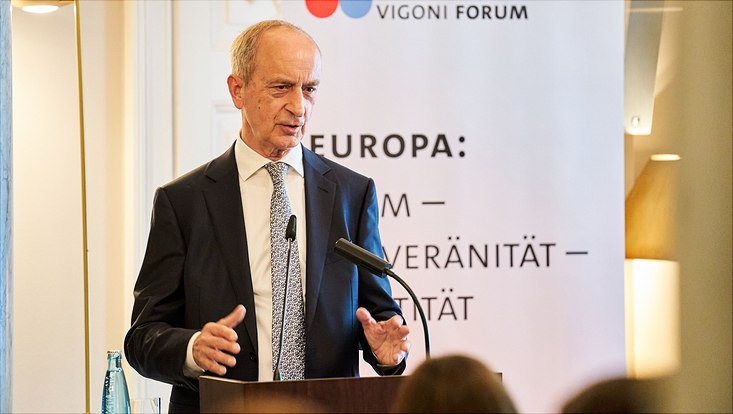Hamburg-Vigoni Forum Launches Work on the Handbook on European ExceptionalismAn ambitious project brings together more than thirty scholars from across the globe to examine Europe’s uniqueness through the lenses of space, sovereignty, and identity.
7 October 2025

Photo: Villa Vigoni
The Hamburg-Vigoni Forum has launched a new and ambitious academic undertaking: the preparation of a comprehensive Handbook on European Exceptionalism. The project aims to provide a rigorous, critical, and interdisciplinary analysis of what makes Europe and the European Union distinctive in global history, politics, and law.
The Handbook will bring together over thirty scholars – both established experts and emerging voices – from all continents. This plurality of perspectives ensures that the exploration of European exceptionalism will not remain confined within Europe itself, but will integrate external viewpoints and critiques from other regions of the world. The diversity of contributors reflects the project’s guiding conviction: that Europe’s claims to uniqueness must be examined not only from within but also through the eyes of those who have engaged with, contested, or resisted Europe’s influence.
The initiative is firmly rooted in the intellectual tradition of the Hamburg-Vigoni Forum. The Forum has consistently promoted dialogue across disciplines and national borders, focusing on the concepts of “space”, “sovereignty”, and “identity”. These three pillars now serve as the structural framework for the Handbook.
The subject of European Exceptionalism has long provoked debate. On the one hand, Europe is often portrayed as the birthplace of democracy, the rule of law, human rights, social welfare, and regional integration. These achievements underpin the narrative of a continent that has offered models of peace and cooperation to the world. On the other hand, Europe’s legacy is also marked by darker chapters: imperial conquest, colonial exploitation, exclusionary nationalism, authoritarian regression, and deep socio-economic inequalities. The Handbook will not seek to resolve these contradictions but rather to expose and analyze them, offering a balanced picture that acknowledges both Europe’s achievements and its failures.
The volume’s interdisciplinary character will be one of its greatest strengths. Philosophers, legal scholars, political scientists, and historians will engage in a common conversation, drawing connections between normative debates, institutional developments, and historical trajectories. This cross-disciplinary approach is essential to understanding how the idea of exceptionalism has been constructed, contested, and transformed over time. For example, legal chapters will address how European Union law embodies – or rejects – claims of uniqueness, while historical contributions will trace Europe’s shifting global roles, and philosophical essays will engage with the normative dimensions of identity, justice, and power.
Equally significant is the Handbook’s commitment to global dialogue. Scholars from Africa, Asia, the Americas, and Oceania will offer perspectives that challenge Eurocentric narratives and highlight the external impact of European policies and practices. In doing so, the volume will encourage readers to reconsider the ways in which Europe is positioned within the broader world order, questioning assumptions of superiority while recognizing genuine innovations.
The structure of the Handbook will be organized into thematic sections corresponding to the Forum’s three conceptual pillars. Under the heading of space, contributors will reflect on Europe as a geographical, political, and imagined territory, exploring both its internal divisions and its external borders. The section on sovereignty will analyze the distinctive trajectories of statehood, governance, and supranational authority in Europe, examining how sovereignty has been redefined in the context of integration and globalization. Finally, the section on identity will address the cultural, symbolic, and normative dimensions of European self-understandings, including feminist, postcolonial, and critical perspectives that highlight the exclusions and silences within dominant narratives.
By adopting this framework, the Handbook does not aim to offer a celebratory account of European distinctiveness. Rather, it seeks to foster a critical and nuanced reflection on what it means to speak of “European exceptionalism” today. Is Europe truly exceptional? And if so, in what ways, and at what costs? These questions will guide the contributors as they map out both the bright and the shadowed sides of Europe’s story.
The Handbook on European Exceptionalism is expected to become a reference point for scholars, policymakers, and a broader public interested in Europe’s evolving role. By combining interdisciplinary expertise with global perspectives, and by grounding its inquiry in the Hamburg-Vigoni Forum’s conceptual triad of space, sovereignty, and identity, the project aspires to deepen our understanding of Europe – not as an isolated entity, but as a complex actor embedded in a world of interdependencies and contestations.


